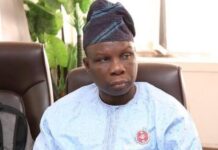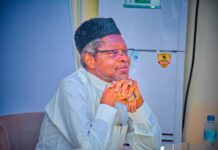Conversation with Azu
Nigerians love travel and adventure. But Ukraine and its forbiddingly cold capital, Kiev, wasn’t a favourite destination for many years. That is until Pastor Sunday Adelaja of the Embassy of the Blessed Kingdom of God for All Nations, fired the public’s imagination with his evangelical-charismatic brand of the gospel.
The news from Kiev last week was not about Adelaja whose outreach has been muted by domestic battles. Nor was it about the outcry of the growing community of Nigerian students in Ukraine who have protested the decision of the Nigerian government to close down Nigeria’s embassy in Kiev as part of a cost-cutting measure.
Almost two decades after the Orange Revolution promised to sweep away the old order in Ukraine, the world is learning, yet again, that the more things appear to change the more they remain the same. In Ukraine, comedy is not just imitating politics; comedy is the new politics.
After nearly 20 years of taking itself too seriously, Ukrainians decided they might as well try laughing at themselves. That was the message of the election by landslide of the lawyer-comedian, Volodymyr Zelensky, as Ukraine’s new president.
In the war for territory and influence between Russia and the West led by the US and Britain, Ukraine has remained a battleground. Russia had sent a message with the so-called annexation of Crimea that it would not take nonsense from the West.
But US and its NATO allies were still prowling Russia’s southern borders, trying to rattle the old bear. The tensions that arose played themselves out in the Orange Revolution in 2004, a revolution which Ukrainians thought they won, and the West believed it won, but which time would show that the ultimate winners were the same old guard that had been declared vanquished.
Between 2004 and the presidential election this March, Ukraine has had four presidents. Virtually all have been from among the oligarchs, a heaving-sounding pronoun for a club of about 100 people whose combined wealth reportedly grew by 43 per cent last year to $37billion when more citizens were getting poorer.
The joke is on my dyed-in-the-wool ideological friends, who believe that ideology of the socialist variety cures all societal ills. The predatory oligarchs of Ukraine made their money, not under the current flux or from the depredations of capitalism. No. They became mega-oligarchs under socialism, the mythical leveler of all comrades. But I assure Kayode Komolafe and other comrades that this is a matter for another day.
Outgoing President Petro Poroshenko, who failed to get a second term, is among the oligarchs, the privileged few former-socialist-turned-capitalist, richer than their country.
When Poroshenko came to power five years ago, the “Chocolate King” (he owns one of the largest confectionery companies in the former Soviet bloc) promised to “personally oversee” the fight against corruption that had impoverished the people and bring an end to the virtual state of war in the country.
He did a few things alright; like cleaning up the banking sector, reforming the state-owned gas company and growing the GDP by about 3.3 percent. But the changes were skin deep. His enthusiasm for change didn’t last a winter.
In a spectacularly famous case, after journalistic investigations revealed a rotten judiciary, Poroshenko promoted even more corrupt judges to a peer review panel. He kicked out a Ukrainian judge, ironically widely known for his anti-corruption credentials, but yet continued to promise that the best was yet to come. Yet, Ukrainians could see that the Confectionery King just couldn’t keep his hand off the cookie jar.
By the time the elections were due in March/April, Gallup said Ukraine was holding the world record in low trust in government. That was evident in the sheer number of candidates who threw their hats in the ring: 39 of them.
Nothing that Poroshenko said mattered anymore. After two revolutions in 20 years, a litany of failed promises and an upsurge in the misery index, Ukrainians seemed determined to try something dangerously new.
The line-up of presidential candidates tells part of the story. Zelensky, the showman-screenwriter-director was the odd man in a battle that featured a former prime minister, two former deputy prime ministers, a former governor, one former defence chief, a professor, economists, veteran politicians and business moguls. In Nigeria-speak, Zelensky’s chances were the political equivalent of Governor Rochas Okorocha becoming the next president.
But Zelensky made it, against all odds. The man who plays poor, honest teacher in the TV series, ‘Servant of the people’, now gets a chance to be the servant of the people for real. If the world was shy about giving professional jokers and TV celebrities a chance to lead before, Americans helped to change that attitude significantly when they voted Donald Trump.
And whether Americans are sorry or just pretend to be sorry about the gift of Trump to world politics, Trump’s disciples are growing, enabled by voters who are fed up with empty promises and broken politics. There is, regrettably, desperation for a difference, however dangerous.
We see that in the Philippines President Rodrigo Duterte, who likened himself to Adolf Hitler, called the Pope the son of a whore and treats women like idiots. Britain’s Nigel Farage, another Trump disciple, used fantastically dodgy figures to con the public into Brexit only for half of the voters to wake up the day after the referendum to start googling the meaning of Brexit.
The Hungarian prime minister, Viktor Orban, even out-Trumped Trump. While Trump was still talking about building a wall, Orban actually built a wall between Hungary and Croatia and closed Hungary’s border with Serbia to keep out desperate Syrian refugees.
It might seem unfair to attach Zelensky to a family tree of ideologically deranged forbears. Indeed, the sentiment in some western capitals is that here, at last, is the man with whom the West can do business. But as surely as the fruit never falls too far from the tree, those who have eyes only need to look at the man behind Zelensky to wonder if Ukrainians are not laughing themselves into trouble.
Zelensky has a godfather, one Igor Kolomoisky, an oligarch and owner of the TV channel which broadcasts Zelensky’s show. Apart from giving Zelensky a platform, reports say Kolomoisky’s lawyer is never far from the president-elect.
Will Zelensky be his own man? It will not take long to find out. When the outgoing president took over in 2014, expectations of change were high from Poroshenko who had campaigned on the slogan of, “Live a new way.”
Five years down the road, voters found that the new way, if it ever existed, only led to Poroshenko’s confectionery shop. It was a new way to nowhere. After the Poroshenko years, Zelensky will have to be more than a celebrity to make his honeymoon last.
Ishiekwene is the Managing Director/Editor-In-Chief of The Interview and member of the board of the Global Editors Network.
Follow the Neptune Prime channel on WhatsApp:
Do you have breaking news, interview request, opinion, suggestion, or want your event covered? Email us at neptuneprime2233@gmail.com




